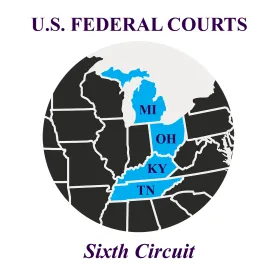The opioid MDL continues to generate significant decisions in the law of civil procedure. Arguably the most significant arrived last week in a much-anticipated ruling, when a divided panel issued a published opinion reversing the district court’s certification of a “negotiation class” in the case. Judge Clay wrote the majority opinion, joined by Judge McKeague, with Judge Moore dissenting.
As this blog twice previewed last year, at issue in this appeal was the validity of an order certifying a class for the purpose of negotiating settlement. The theory was to facilitate settlement by fixing the size of the group with which defendants could negotiate. To accomplish that goal, the order included in the class every city and county in the country, unless a prospective class member opted out within sixty days of the order. Class members would know in advance the percentage of any eventual settlement allocated to them, but necessarily would not know the settlement amount. Thereafter, if a supermajority of six categories of voting class members agreed to a proposed settlement, that agreement would bind the entire negotiating class and would then be presented to the court for approval under Rule 23(e) of the Federal Rules of Civil Procedure. No defendant was required to negotiate with the class, and the bellweather trials were to continue. This novel procedure was the brainchild of “Professor Francis E. McGovern, a special master appointed to aid the district court in the MDL, in collaboration with Professor William B. Rubenstein.” (Tragically, Professor McGovern, a national expert in ADR and mass tort litigation, passed away unexpectedly earlier this year.)
The overwhelming majority of putative class members did not opt out after the certification order, but that overwhelming majority included six cities that objected the validity of the order. Those six cities, together with certain opioid-distributor and retail-pharmacy defendants, sought and received permission to take an interlocutory appeal of the order under Rule 23(f).
Judge Clay’s majority opinion concluded that “the negotiation class ordered by the district court simply is not authorized by the structure, framework, or language of Rule 23.” The majority reasoned that the text of the rule specifically contemplated the certification of classes to litigate cases and to compromise them, not to negotiate. In addition, the majority was unpersuaded by the district court’s predominance analysis and troubled by its certification of the class based on federal RICO and Controlled Substance Act claims without reference to disparate state law claims.
Dissenting, Judge Moore agreed that the text of Rule 23 did not specifically contemplate a negotiation class—but neither did it prohibit the device. Her lengthy and scholarly opinion, which included citation of her own academic work before taking the bench, reviewed the history of settlement classes before Rule 23 was amended to incorporate that concept. In her view, the purposes behind Rule 23 and the Federal Rules of Civil Procedure generally favored permitting the district court’s innovative procedure.
This case appears to be the only one in which the validity of a negotiation class has been adjudicated. It will be interesting to see whether district courts overseeing MDLs in other circuits try it.




 />i
/>i

